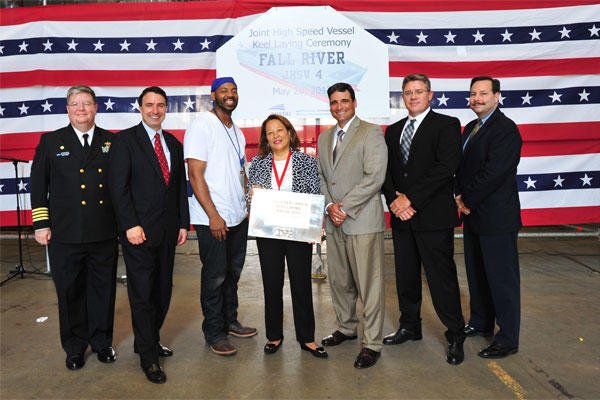WASHINGTON -- The Navy will christen Joint High Speed Vessel (JHSV) Fall River Jan. 11, during a 10 a.m. CST ceremony in Mobile, Ala.
Secretary of the Navy Ray Mabus will deliver the ceremony's principal address. Diane Patrick, the first lady of Massachusetts, will serve as the ship's sponsor.
Upon delivery to the U.S. Navy's Military Sealift Command (MSC), Fall River will be designated as a United States naval ship (USNS), and will have a core crew of 21 civilian mariners who will operate and navigate the ship.
"The christening of USNS Fall River marks the culmination of the hard work, skill and dedication of the hundreds of shipyard workers who have labored tirelessly to produce this modern marvel," Mabus said. "This highly-advanced platform not only represents a key part of our Navy's future, but also celebrates the long and proud partnership enjoyed by the U.S. Navy and the state of Massachusetts; a partnership dating back to the founding of the service."
The future USNS Fall River, the fourth Spearhead-class JHSV, will be the second ship to bear this name in honor of the city of Fall River, Mass., and the service of the men and women from that city.
The first USS Fall River (CA 131) was a Baltimore-class heavy cruiser commissioned in 1945 and used largely on training missions. The tip of the bow of the decommissioned cruiser is on display at Battleship Cove in Fall River.
The 338 foot-long aluminum catamaran is being constructed by Austal USA in Mobile, Ala. These ships are ideal for fast, intra-theater transportation of troops, military vehicles, supplies and equipment. They are capable of transporting 600 short tons 1,200 nautical miles at an average speed of 35 knots and can operate in austere ports and waterways, providing U.S. forces added mobility and flexibility. JHSVs also have an aviation flight deck and berthing space for up to 104 personnel and airline-style seating for up to 312.
Military commanders will have the flexibility to use the JHSV in a variety of roles, including support to overseas contingency operations, special operations forces, emerging joint sea-basing concepts and conducting humanitarian assistance and disaster relief.




























